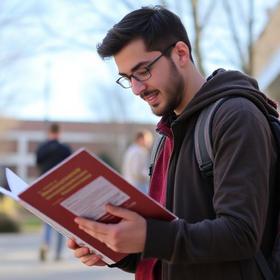- Founded in 1961 and established primarily as a transfer institution to prepare students for admission to four-year colleges and universities, Chabot College has earned a solid reputation for educational excellence. Chabot?s student demographics have, in particular, changed dramatically since our inception.
School Highlights
Chabot College serves 17,054 students (20% of students are full-time).
The college's student-teacher ratio of 37:1 is higher than the state community college average of 32:1.
Minority enrollment is 83% of the student body (majority Hispanic), which is more than the state average of 77%.
Quick Facts (2025-26)
- Enrollment: 17,054 students
- In-state tuition: $1,138
- Out-state tuition: $6,970
- Student-teacher ratio: 37:1
- Minority enrollment: 83%
- Source: Integrated Postsecondary Education Data System (IPEDS)
Top Rankings
Chabot College ranks among the top 20% of public schools in California for:
School Overview
The teacher population of 467 teachers has stayed relatively flat over five years.
Chabot College
(CA) Community College Avg.
Carnegie Classification
Associate's Colleges: High Transfer-High Traditional
Baccalaureate/Associate's Colleges: Associate's Dominant
Institution Level
At least 2 but less than 4 years
At least 2 but less than 4 years
Institution Control
Public
Public
Total Faculty
467 staff
315 staff
Student Body
The student population of Chabot College has grown by 26% over five years.
The student-teacher ratio of 37:1 has increased from 26:1 over five years.
The Chabot College diversity score of 0.74 is more than the state average of 0.70. The school's diversity has stayed relatively flat over five years.
Total Enrollment
17,054 students
9,796 students
Student-Teacher Ratio
37:1
32:1
# Full-Time Students
3,377 students
1,259 students
# Part-Time Students
13,677 students
8,537 students
# Enrollment Undergraduate
170 students
242 students
# Full-Time Undergraduate Students
3,377 students
1,250 students
# Full-Time Graduate Students
n/a
63 students
# Part-Time Undergraduate Students
13,677 students
8,299 students
# Part-Time Graduate Students
n/a
10 students
Total Dormitory Capacity
n/a
121 students
% American Indian/Alaskan
n/a
n/a
% Asian
24%
13%
% Hispanic
40%
47%
% Black
9%
7%
% White
17%
23%
% Hawaiian
1%
1%
% Two or more races
6%
5%
% Non Resident races
n/a
1%
% Unknown races
2%
3%
Diversity Score
0.74
0.70
College Completion Rate (Students who graduate in less than 4 years)
35%
42%
College Completion Rate (Students who graduate in 4 years or more than 4 years)
n/a
43%
Average Graduate Earnings (10 Years)
$39,800
$34,700
Tuition and Acceptance Rate
The public in-state tuition of $1,138 is less than the state average of $1,516. The in-state tuition has stayed relatively flat over four years.
The public out-state tuition of $6,970 is more than the state average of $6,779. The out-state tuition has declined by 14% over four years.
In-State Tuition Fees
$1,138
$1,516
Out-State Tuition Fees
$6,970
$6,779
Tuition Notes
$46 per unit
% Students Receiving Some Financial Aid
75%
85%
Median Debt for Graduates
$10,000
$10,500
Median Debt for Dropouts
$7,875
$6,239
Acceptance Rate
n/a
93%
Source: 2024 (or latest year available) Integrated Postsecondary Education Data System (IPEDS) , School Administrators
School Notes
- Since 1967 the Chabot College Foundation has established its presence in the region. During the past year, 12 campus programs received financial support through the efforts of the Board's charitable work. The faculty and staff of Chabot College are committed to supporting student success. Last year Chabot College hosted over 100 international students from 30 different countries. Thousands of other international students have graduated, improved their English and transferred to a university throughout the past years. Career counseling provides the student with an opportunity for clarification and integration of career and educational goals, study of careers and lifestyles, vocational and career testing, and presentation of resource speakers. Counselors also provide courses and one-to-one career counseling. Student Services provides a variety of programs and procedures through which individuals are brought into the college for instruction, assisted in career planning & development, asissted in planning for and pursuing courses of study, provided with avenues for obtaining financial aid & employment, and given an opportunity to participate in many different activities. Student Services is also responsible for record-keeping and reporting in matters relating to student progress, attendance, and status, for health & emergency care procedures, and for the general supervision and control of the campus. The Media Services Center provides multimedia products and services designed to support and enhance faculty instruction, class projects, and campus events. Communication of the subject matter, retention of information and a lively exchange of ideas is certainly improved when all of our senses are engaged.
Frequently Asked Questions
How much does Chabot College cost?
Chabot College's tuition is approximately $1,138 for In-State students and $6,970 for Out-State students.
What is Chabot College's ranking?
Chabot College ranks among the top 20% of community college in California for: Diversity in US community colleges and Largest student body.
In what neighborhood is Chabot College located?
Chabot College is located in the Mount Eden neighborhood of Hayward, CA.
School Calendar
View the Chabot College yearly calendar below.
Recent Articles

How to Transfer from Community College to a Four-Year University in 2025
A step-by-step guide for community college students transferring to a four-year university in 2025 — updated strategies, data and expert insights.

Scholarships for Community College Students 2025
Explore updated scholarship programs, tuition data, and expert strategies for community college students in 2025.

The Rise of Technical and Vocational Training in 2025
Explore the 2025 surge in technical and vocational training—enrollment, policy, costs, and why this path is gaining ground for students and parents.









